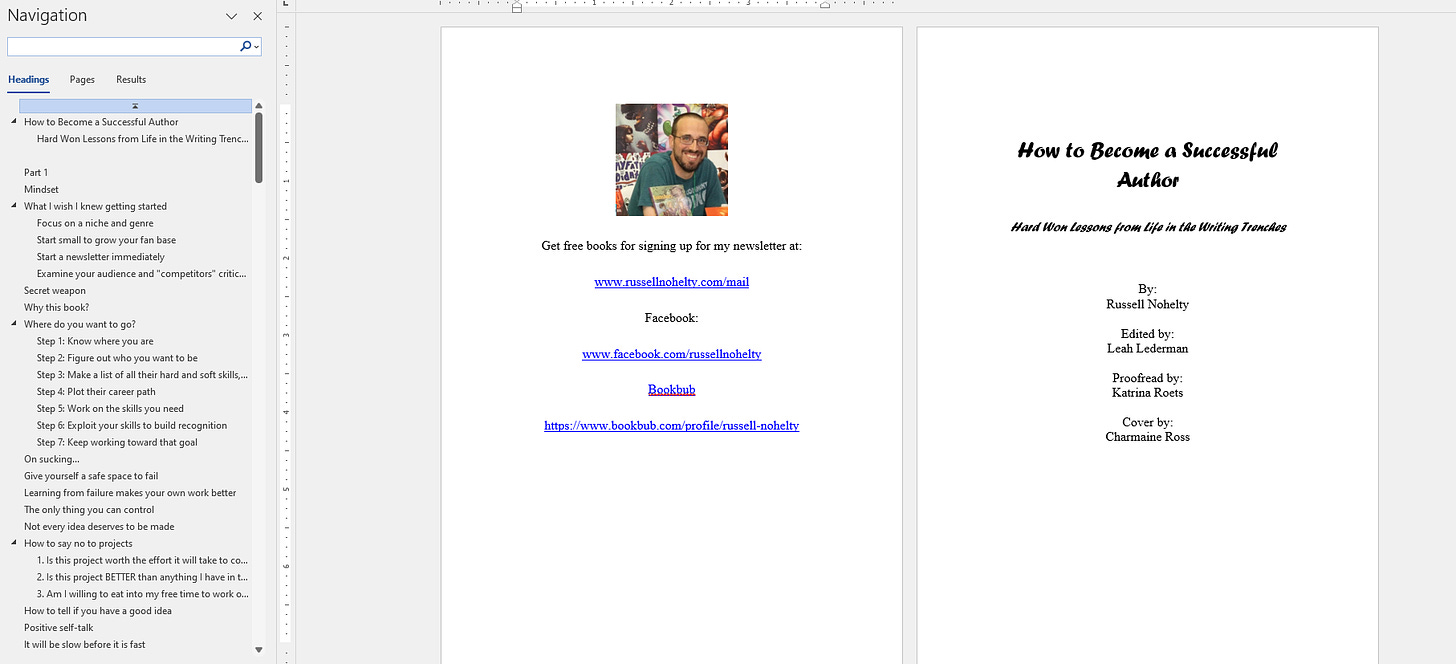How to compile your blog into a book
Most of my non-fiction books start as blog posts before they are compiled into a book, and I wouldn't write non-fiction any other way.
Hi friends,
I’ve released three solo non-fiction books up to this point in my career, all of which paid members can read for free:
Since I talk about them often, you might know they exist, but did you know that the last two books on this list were compiled almost exclusively through repurposing blog articles and Facebook posts?
Additionally, I’m working on a book called How to Survive as a Writer in a Capitalist Dystopia, which will be mostly comprised of bits I worked out on this publication, too.
Even Direct Sales Mastery for Authors was mainly compiled from bits from The Author Stack, at least my portion of it, although for that book I knew what we needed and was just writing the pieces we needed in public.
For the other four books, though, I didn’t quite know there would be a book, or what that book would be when I set out to write the content for them.
In fact, it was my intention to only write one non-fiction book in my whole career (ha!), but people kept asking me for more, especially for a book specifically aimed at authors. Since I was writing a daily blog at the time called The Complete Creative, it made logical sense to at least start with the information I had compiled there.
Then, three years later my Facebook account was blinked out of existence. Luckily, I had a backup of all my best posts and could compile another collection of my best work.
From those books, I developed a system for bringing my blog content into book format that might be a good template for you to follow.
It’s important to note that I write a lot because it’s how I process the world. I don’t expect anyone else to write as much as me, but writing is how I self-soothe. I generally write fiction to have control of a world when this one feels too chaotic to manage. I write non-fiction to process things I am seeing in the world and make sense of concepts noodling around my brain. I don’t feel like I really understand a concept until I finish a piece about it.
You might only have enough content to make a book every five years or ten, or you might be able to do it every year. There is no right or wrong here, just advice that might work for you or not.
Stage 1: Gather everything into one place
The first step to compiling a book is to get it off your blog to live in another document.
Personally, I like using Microsoft Word for this part of the process because I’m a fossil living in the past. I know Scrivener, Plottr, Atticus, and other programs make it easier to do this work, but I like Microsoft Word because it’s what I know and my brain is wired to think using its functionality.
I appreciate that Word allows me to see all the headings and subheadings in the left-hand sidebar. This is very important to the next part of my process.
Whatever platform you choose, the first step is to manually transfer everything from your blog into this new document.
“But Russell,” I hear you say. “Why can’t I just export the whole thing into a document?”
Because the whole point is to create high touch points with your work. By manually transitioning each piece, it forces you to read and think about it. In doing so, you’ll find articles that don’t represent your best work and be able to cut them immediately. If you do this automatically or without intentional thought, it will disrupt this immensely important part of the process. This is not a process to optimize. The process is the point.
When you get further into building this document you’ll start seeing how certain articles could be placed together for maximize impact. We don’t usually write a blog in sequential order, so this is the first chance we have to impose order on chaos. Don’t fight the urge to group like things together into what we call “buckets”. Having 3 to 5 good buckets of like-minded bits and bobs will really help you moving forward.
By the way, you can also do this work in an email program like Convertkit. Here is an early build of my next book as a Convertkit autoresponder sequence.
It wasn’t until I started compiling this sequence that a theme emerged meaty enough to warrant being considered a book. Finding the thematic throughlines by reading your work again in short order and curating only the best things is what we’re after with this process.
This kind of work takes as long as it takes. Don’t hire an editor yet or have AI replace you to do this work. Once you’re done, we’ll have what they call in the movies an “assembly cut”.
It’s supposed to be awkward and clunky right now. We’ll refine it in future stages.
Stage 2: Bringing order to chaos
Keep reading with a 7-day free trial
Subscribe to The Author Stack to keep reading this post and get 7 days of free access to the full post archives.






